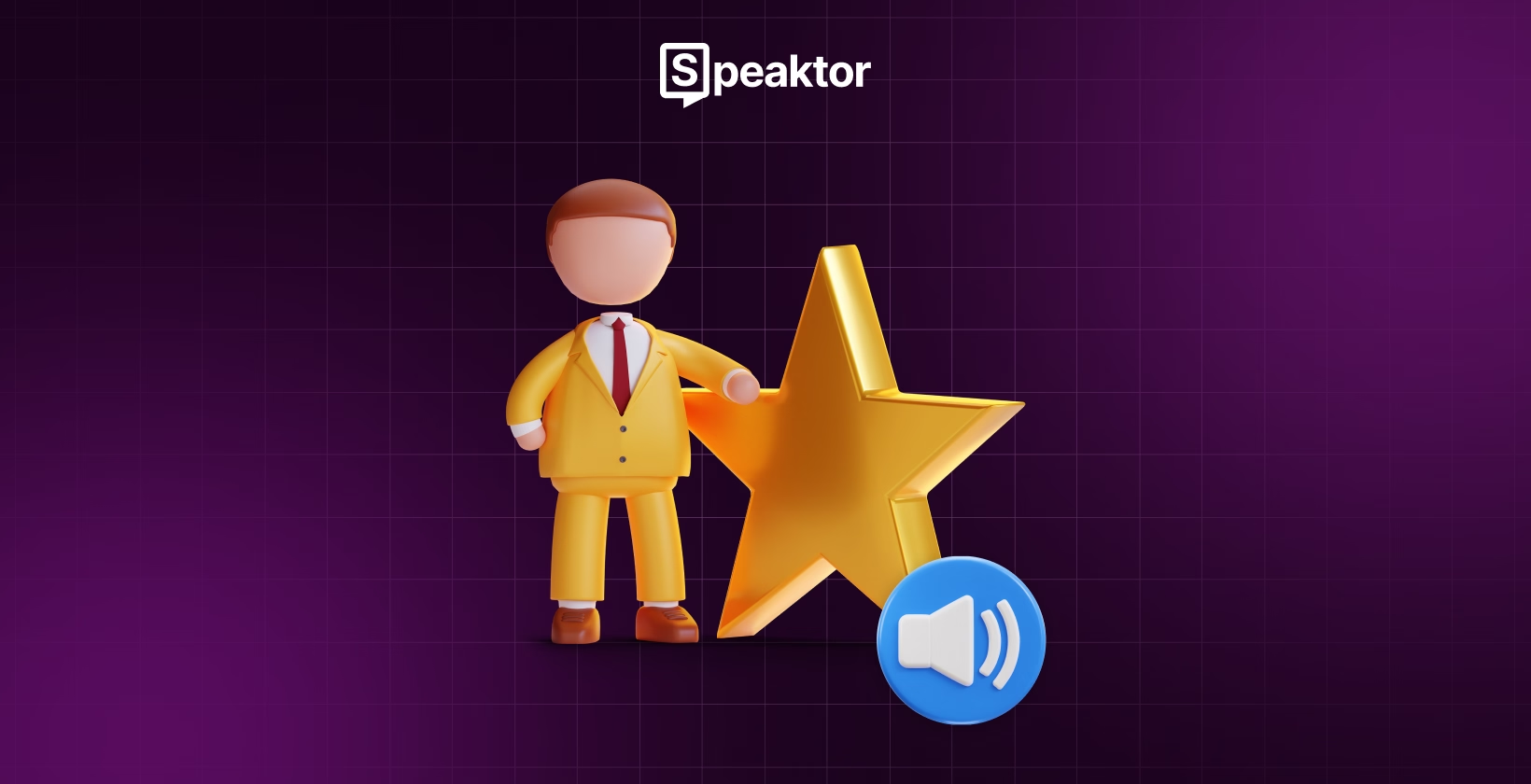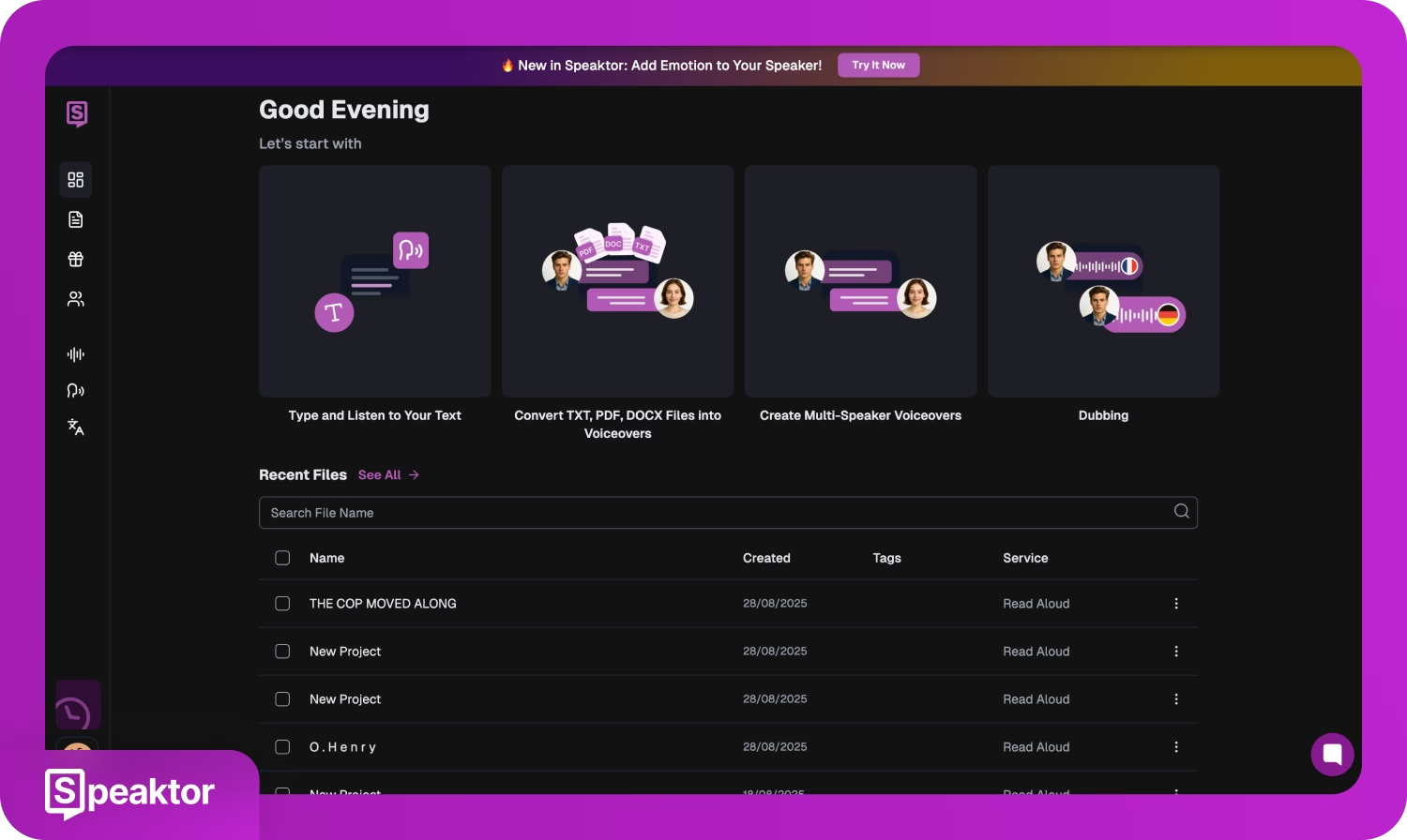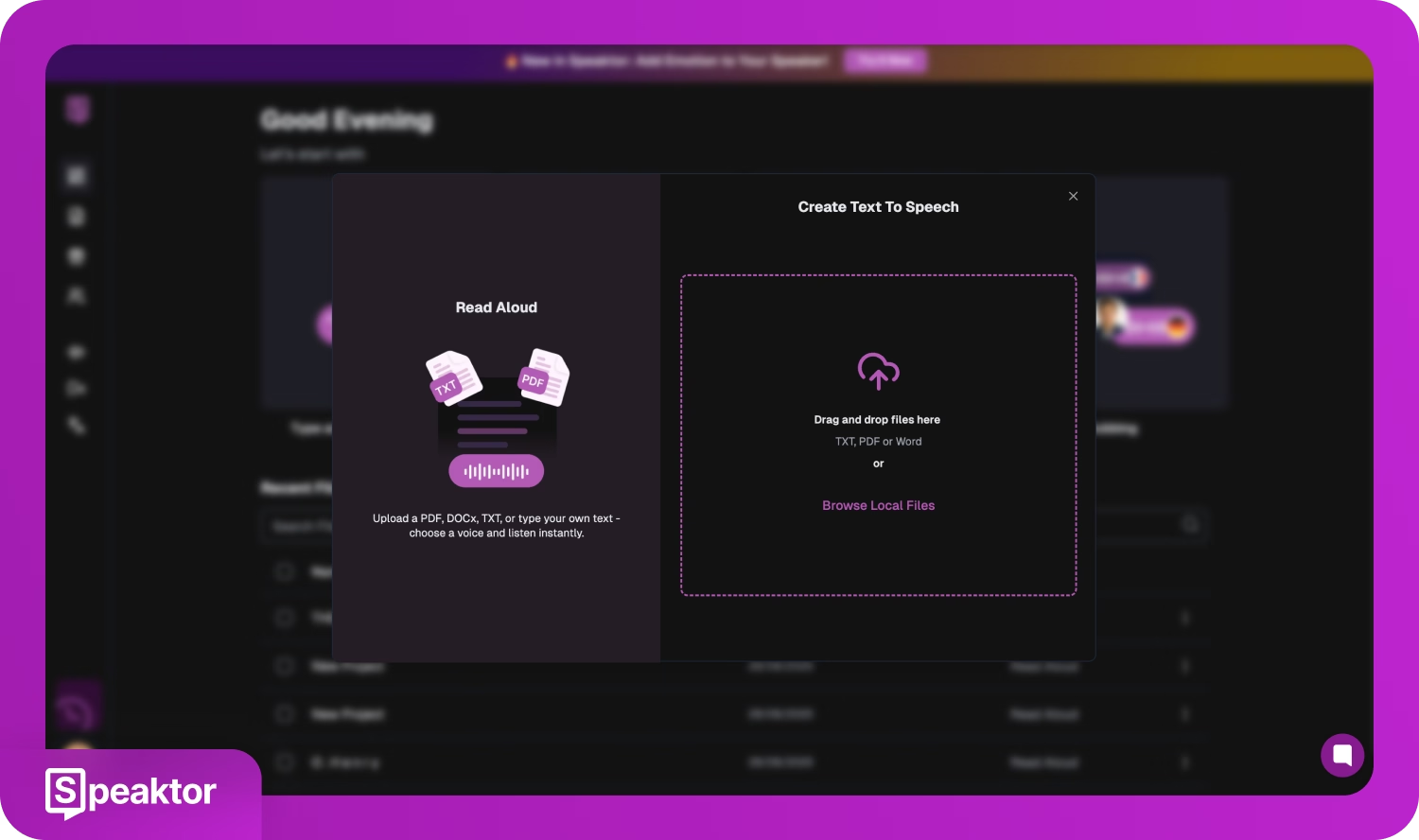
Celebrity Voice Generator: Risks, Regulations & Responsible Alternatives
Table of Contents
- How do AI celebrity voice generators work?
- What are the common risks of celebrity voice generation?
- Industry regulations on celebrity voice cloning
- How should you proceed with celebrity voice generators?
- What are the responsible use cases for voice AI?
- Safer alternative to celebrity voice generators
- Take the ethical path forward with voice AI tools
Transcribe, Translate & Summarize in Seconds
Table of Contents
- How do AI celebrity voice generators work?
- What are the common risks of celebrity voice generation?
- Industry regulations on celebrity voice cloning
- How should you proceed with celebrity voice generators?
- What are the responsible use cases for voice AI?
- Safer alternative to celebrity voice generators
- Take the ethical path forward with voice AI tools
Transcribe, Translate & Summarize in Seconds
TL;DR
Celebrity voice generator tools are creative but carry major risks like scams, misinformation, brand damage, and legal disputes
Regulators worldwide are moving fast to protect voices as part of personal identity
Responsible use cases of voice AI include accessibility (restoring lost speech), localization (multi-language content), and creative media (storytelling, education, parody)
The safer choice is to avoid cloning real people and opt for platforms like Speaktor, which provides natural-sounding synthetic voices across 50+ languages without legal or ethical risks
Celebrity voice generators have exploded in popularity, letting anyone make a pop star narrate a podcast, or a famous actor deliver a joke in your group chat.
On the surface, the tool feels playful and innovative. Underneath, though, the technology raises thorny questions about privacy, legality, and ethics.
Celebrity voice generation tools rely on advanced AI models that can mimic tone, cadence, and personality with uncanny accuracy. That opens doors for creative use cases like dubbing films into multiple languages, making audiobooks more engaging, or giving people with speech loss new ways to communicate.
But there’s a darker side: cloned voices are already being weaponized in scams, misinformation campaigns, and unlicensed endorsements. For celebrities, it’s a direct threat to reputation and income. For industries like media, entertainment, and banking, it’s a regulatory and trust challenge.
How do AI celebrity voice generators work?
At their core, celebrity voice generators rely on AI-powered speech synthesis. They take real recordings of a person’s voice and train neural networks to mimic their unique patterns.
The process involves two key components:
- Voice cloning models: Deep learning models analyze a person’s vocal characteristics, such as pitch, tone, rhythm, and accent. With enough samples, the system builds a digital voiceprint that captures the essence of how that person speaks.
- Text-to-speech (TTS) or speech-to-speech engines: Once the model has learned the voice, it can generate new audio. You can type in text (TTS) or provide your own spoken input (speech-to-speech), and the AI recreates it in the cloned celebrity’s voice.
Modern systems can even capture emotion and inflection to make the output sound more authentic than robotic. Since training and rendering often happen in the cloud, anyone with a consumer-friendly app can produce celebrity-like audio within minutes.
What are the common risks of celebrity voice generation?
1. Scams and cybercrimes
In a high-profile 2024 case, an employee at a multinational firm was deceived into transferring over $25 million due to a deepfake video call featuring a cloned CFO. Fake emergency calls or cloned voices are being used to trick victims into handing over money or sensitive information. These attacks are harder to detect than traditional phishing because they sound authentic.
2. Legal battles
A person’s voice is considered part of their identity. Using it without consent can infringe on their right of publicity or likeness, leading to lawsuits. In industries like advertising, gaming, or film, unlicensed use of a celebrity’s voice can breach contracts and trigger expensive legal disputes.
3. Brand damage
If a celebrity’s cloned voice appears to endorse a product or opinion they never agreed to, it can erode trust in both the celebrity and the brand. For companies, association with unlicensed voice cloning can be seen as unethical and harm customer loyalty.
4. Misinformation
Audio deepfakes make it easier to spread false information or manipulate public opinion. A convincing fake news clip or political statement in a well-known voice can be especially damaging because people tend to believe what they hear.
5. Security risks
Between 2024 and 2025, AI impersonation scams surged alarmingly by 148%. Voice authentication systems, widely used in banking and customer support, are now vulnerable targets. With a cloned voice, attackers can sidestep identity checks and unlock access to sensitive accounts.
Industry regulations on celebrity voice cloning
United States
- Tennessee’s ELVIS Act (2024): The first U.S. law explicitly protecting performers’ voices against AI misuse. It makes unauthorized cloning a criminal offense and was pushed forward with strong support from music labels and artists’ unions.
- NO FAKES Act (to be reintroduced in 2025): A bipartisan federal bill that would ban unauthorized AI replicas of a person’s voice or likeness. It includes exceptions for parody and journalism, but introduces a takedown process for victims to reclaim control of their identity.
- TAKE IT DOWN Act (2025): While focused mainly on non-consensual intimate imagery, TAKE IT DOWN Act signals that deepfake regulation is now firmly on Washington’s agenda, laying groundwork for broader protections.
Europe
- EU AI Act (effective 2024): The world’s first comprehensive AI law. It categorizes deepfake technologies (including voice cloning) as “high risk” when used deceptively, requiring clear disclosure and stricter compliance.
- Denmark’s proposed law (2025/26): A groundbreaking amendment to copyright law that would give people explicit ownership rights over their voice, face, and likeness. Victims of unauthorized cloning could demand takedowns and compensation. The proposed law could become a model for other EU states.
Beyond the U.S. and Europe, other countries are also moving quickly to address the risks of celebrity voice cloning, or voice cloning in general.
From Asia to Latin America, policymakers are exploring new rules that balance innovation with protection against identity theft and misinformation.
Approaches vary, but the global trend is clear: industry regulators are treating voice cloning as a high-stakes issue that demands legal clarity and safeguards for individuals.
How should you proceed with celebrity voice generators?
- Secure explicit consent: If you intend to use a real person’s voice, get written approval from them or their estate. It’s the clearest safeguard against legal or reputational fallout.
- Be transparent with audiences: Always disclose when a voice is AI-generated. A simple disclaimer builds trust and avoids the perception of deception.
- Keep away from high-risk areas: Political messaging, healthcare advice, financial instructions, and commercial endorsements are especially dangerous without licenses.
- Choose compliant platforms: Rely on tools that offer watermarking, usage logs, and takedown features, showing they take misuse seriously.
Celebrity voice cloning may be fraught with risk, but voice AI technology itself has meaningful and ethical applications.
What are the responsible use cases for voice AI?
Accessibility
Voice AI gives people who have lost their natural speech a way to communicate again. By training models on past recordings, individuals can preserve or even restore their own voices. For others, natural-sounding AI voices make screen readers, assistive devices, and everyday digital interactions more inclusive.
Did you know:
After brain surgery, 21-year-old Lexi Bogan lost her ability to speak. Using a 15-second video, researchers worked with OpenAI to recreate her teenage voice, which she now uses through an app to communicate and handle everyday tasks.
Localization
AI voice generators can help scale content across languages without sacrificing expression. From dubbing films and TV shows to making e-learning materials or audiobooks available globally, licensed AI voices make localization faster, more affordable, and more engaging.
Creative media and storytelling
Artists, educators, and creators are experimenting with AI voices for parody, satire, and immersive storytelling. When audiences are clearly informed that the voices are synthetic, AI can add new layers of creativity, revive historical narrations, experiment with character voices, or push the boundaries of digital art.
Safer alternative to celebrity voice generators
If you want the benefits of voice AI without the legal or ethical risks, the safest option is to use tools designed for accessibility and content creation rather than impersonation.
One such option is Speaktor. Instead of cloning real people, Speaktor offers a library of natural-sounding synthetic voices across multiple languages. It’s widely used for creating AI voiceovers, audiobooks, e-learning modules, podcasts, and also for making content accessible for people with reading difficulties.

Because Speaktor’s voices aren’t tied to celebrities, you get the advantages of AI voice technology: scalability, clarity, and multilingual support, without the risk of violating someone’s identity rights.
Here’s why Speaktor stands out as an AI voiceover app:
- Enables voice synthesis across 50+ languages and dialects
- Delivers realistic and expressive AI-generated speech
- Lets you paste text or upload documents in PDF, TXT, or DOCX formats
- Offers a wide range of voices and settings like tone, style, emotion, and pace, allowing tailored audio for different audiences
- Supports easy audio export in MP3 or WAV formats
- Comes with an intuitive web dashboard and mobile app; accessible across desktop, Android, and iOS

Take the ethical path forward with voice AI tools
Celebrity voice generators surely feel exciting, but the risks of legal disputes, reputational harm, and regulatory crackdowns often outweigh the novelty.
The safer choice is to avoid tools that mimic real people, and rely on AI voice generation tools or text-to-speech software designed for accessibility, creativity, and content production.
That’s where platforms like Speaktor come in. By offering a wide range of natural-sounding synthetic voices across languages, Speaktor gives you the benefits of AI voice technology without the ethical or legal concerns tied to cloning.
If you want to put voice AI voices to work responsibly, start experimenting with Speaktor today!
Frequently Asked Questions
No, unless you have explicit written consent to use the celebrity's voice. Using celebrity voices without consent can lead to legal action, brand damage, and even scams. If your goal is simply to convert text into high-quality narration, a realistic AI voice generator like Speaktor offers a safer alternative without impersonating public figures.
A celebrity voice changer mimics a specific person, while an AI voice generator creates synthetic voices not tied to real identities. The former raises privacy and copyright concerns, whereas the latter is designed for professional voiceovers, audiobooks, or e-learning. With tools like Speaktor, you can generate audio in multiple languages without crossing legal boundaries.
Yes. An AI celebrity voice generator can capture pitch, tone, and linguistic nuances of human speech patterns. However, accuracy doesn’t equal permission. These systems can mimic a desired celebrity voice, but the safer approach is to use platforms that produce expressive but neutral AI voices for creative projects.
Yes. Many platforms provide a free AI voice generator option to help users test features. Speaktor, for instance, allows you to convert text into natural AI voice outputs across multiple languages so you can create voice recordings for training videos, podcasts, ebooks, or social media content without relying on unauthorized celebrity AI voice clones. You can try it for free!
Yes. Today’s realistic voice technology makes it possible to achieve studio-quality narration without celebrity voice impressions. For example, Speaktor’s lifelike AI voice generator provides expressive, natural audio files that rival voice actors.
Using a celebrity AI voice generator may attract short-term attention, but it also exposes companies to copyright disputes, regulatory fines, and reputational harm. Brands risk losing trust if a generated voice is mistaken for a real endorsement. That’s why enterprises often choose AI voice generators like Speaktor, which provide scalable voice quality without imitating unique celebrity voices.

